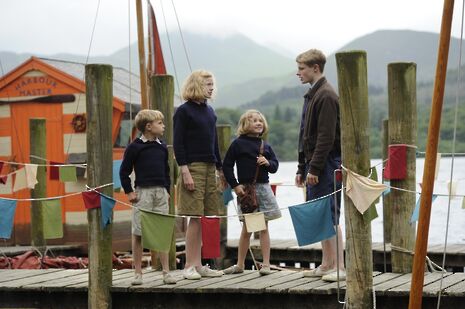Film: Swallows and Amazons
A charming and faithful adaptation of Ransome’s novel

When it comes to adapting many books written in the 1930s and 1940s onto the big screen, writers and directors typically face a tough challenge: maintaining the spirit of the era while allowing a modern audience to identify and engage with the child protagonists. There is a tough spectrum to navigate, with the aim to be more The Lion, The Witch and the Wardrobe than Enid Blyton. With Swallows and Amazons, Philippa Lowthorpe and Andrea Gibb have managed to negotiate that dichotomy to produce a heart-warming and entertaining story of childish innocence meeting the mysterious and dangerous world of adult espionage.
Based on Arthur Ransome’s 1930 novel, Swallows and Amazons documents the adventures of the young crews of two sailing boats. Manning The Swallow are the four Walker children: city-kids John, Susan, Tatty (whose name was infuriatingly changed from Titty in an attempt to satisfy overly sensitive parents) and Roger. Meanwhile, the talented sailors in control of The Amazon are the Blackett sisters: Nancy and Peggy. While engaging in a high-spirited ‘battle’ between themselves for control of an island in the middle of a Cumbrian lake, they unintentionally stumble into the world of British spy Jim Turner and his Russian foes. Alternating between an intriguing mystery story and a Bildungsroman, the plot is slightly implausible but gripping nonetheless, complete with moments of real suspense.
On the whole, the cast is superb. The dynamic between hostel owners Mr and Mrs Jackson (Harry Enfield and Jessica Hynes) produces actual moments of comedy with laughter in the cinema coming from all age groups – including this cynical third-year student. Andrew Scott, playing one of the Russian spies, channels into his role everything that made him such a fantastic Moriarty in the BBC’s Sherlock series, to create a subtly menacing and enigmatic villain; his Lazlov is layered and absorbing and steers well clear of falling into the trap of being too pantomime-y.
Opposite Scott, Rafe Spall’s Turner is an effective change from Ransome’s initial characterisation: gone is a middle-aged, volatile and resourceful recluse (supposedly Ransome’s self-portrait), replaced by a younger, attractive hero-like figure. Dane Hughes as John and Orla Hill as Susan also manage to effectively balance their characters’ desire to seem mature in the eyes of their mother, yet also grasp the childish excitement with which they approach the idea of sailing off into the wilderness. In particular, Hughes’ performance during a firearm stand-off with Lazlov superbly captures John’s internal struggles and his desperation to prove himself as brave. Teddie-Rose Malleson-Allen as Tatty and Bobby McCulloch as Roger do well to keep their younger characters authentic, believable and – frankly – cute as hell.
The photography – supported by Ilan Eshkeri’s gorgeous soundtrack – sublimely captures the idyllic romance of the underlying premise of the film: two sets of siblings exploring the rolling hills and clear waters of the Lake District. Indeed, some of the film’s best moments are those in which very little happens, with panoramic, action-free shots of The Swallow gliding across the water helping a 21st century audience rationalise the joy that such an escape to the country can bring.
However, on occasion, the pace of the film is frustrating and the chemistry between the children sometimes lacking – not helped by dialogue that struggles to find the right point on the spectrum of good-natured innocence and infuriating immaturity. Seren Hawkes’ portrayal of Nancy Blackett is also over-acted: cries of “scurvy dogs” and “sons of sea snakes” were jarringly delivered. And it was also hard not to question the inclusion of chase sequence inside and outside a train or the Amazons’ use of real, potentially fatal, bows and arrows.
Nonetheless, Lowthorpe and Gibb – who admirably pay close deference to the original material – have produced a charming and likeable film that is easy to watch. Ransome’s story was always a pleasant and good-natured tale: to successfully adapt it thus hinges on its execution and, while not setting the world alight, this film provides cross-generational entertainment that would be ideal for an extended family, all curled up in the living room in need of something to pass the time on a rain-washed weekend afternoon.
 News / Report suggests Cambridge the hardest place to get a first in the country23 January 2026
News / Report suggests Cambridge the hardest place to get a first in the country23 January 2026 News / Reform candidate retracts claim of being Cambridge alum 26 January 2026
News / Reform candidate retracts claim of being Cambridge alum 26 January 2026 Interviews / Lord Leggatt on becoming a Supreme Court Justice21 January 2026
Interviews / Lord Leggatt on becoming a Supreme Court Justice21 January 2026 News / Cambridge ranks in the top ten for every subject area in 202623 January 2026
News / Cambridge ranks in the top ten for every subject area in 202623 January 2026 Comment / Cambridge has already become complacent on class23 January 2026
Comment / Cambridge has already become complacent on class23 January 2026










